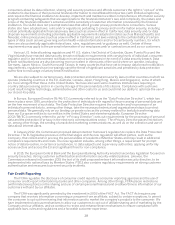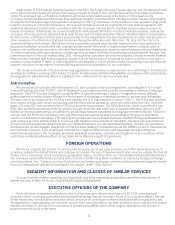American Express 2015 Annual Report Download - page 46
Download and view the complete annual report
Please find page 46 of the 2015 American Express annual report below. You can navigate through the pages in the report by either clicking on the pages listed below, or by using the keyword search tool below to find specific information within the annual report.
An increasing prevalence of surcharging by merchants could materially adversely affect our business and
results of operations.
In certain countries, such as Australia and certain Member States in the EU, merchants are permitted by law to
surcharge card purchases. The number of countries in the EU that permit surcharging and the potential for selective
surcharging of American Express cards only could increase following adoption of new EU-wide regulation, as
discussed in “Global Network & Merchant Services — Regulation.” In Australia, we have seen increasing merchant
surcharging on American Express cards in certain merchant categories and, in some cases, on a basis that is greater
than that applied to cards issued on the bankcard networks, which is known as differential surcharging.
If surcharging becomes widespread, American Express cards and credit and charge cards generally could become
less desirable to consumers, which could result in a decrease in cards-in-force and transaction volumes. The impact
could vary depending on the manner in which a surcharge is levied and whether surcharges are levied upon all
payment cards, whether debit cards are excluded, or whether the amount of the surcharge varies depending on the
card, network, acquirer or issuer. Surcharging could have a material adverse effect on our business, financial condition
and results of operations, particularly to the extent surcharging disproportionately impacts our Card Members
through differential surcharging or otherwise.
If we are not able to invest successfully in, and compete at the leading edge of, technological developments
across all our businesses, our revenue and profitability could be negatively affected.
Our industry is subject to rapid and significant technological changes. In order to compete in our industry, we need
to continue to invest in business process and technology advances across all areas of our business, including in
transaction processing, data management and analysis, customer interactions and communications, alternative
payment mechanisms and risk management and compliance systems. Incorporating new technologies into our
products and services may require substantial expenditures and take considerable time, and ultimately may not be
successful. We expect that new technologies in the payments industry will continue to emerge, and these new
technologies may be superior to, or render obsolete, the technologies we currently use in our products and services.
Our success will depend in part on our ability to innovate by offering new payment services products, develop new
technologies and adapt to technological changes and evolving industry standards. Consumer and merchant adoption
is a key competitive factor and our competitors may develop products, platforms or technologies that become more
widely adopted than ours. If we are unable to continue to keep pace with innovation, manage the shift to mobile,
device-based and multi-channel commerce, drive adoption of new products and services or improve the quality of the
Card Member experience, our business and results of operations could be adversely affected.
Our ability to develop, acquire or access competitive technologies or business processes on acceptable terms
may also be limited by intellectual property rights that third parties, including competitors and potential competitors,
may assert. In addition, our ability to adopt new technologies may be inhibited by a need for industry-wide standards, a
changing legislative and regulatory environment, the need for internal product and engineering expertise, resistance to
change from Card Members or merchants, or the complexity of our systems.
We may not be successful in our efforts to promote card usage through our marketing, promotion, merchant
acceptance and rewards programs, or to effectively control the costs of such programs, both of which may
impact our profitability.
Increasing consumer and business spending on our cards and growing card lending balances depend in part on
our ability to develop and issue new or enhanced cards and increase revenues from such products. If customers do not
perceive our new offerings as providing significant value, they may fail to accept our new products and services, which
would negatively impact our results of operations. Increasing spending on our cards also depends on our continued
expansion of merchant acceptance of our cards. If the rate of merchant acceptance growth slows or reverses itself,
our business could suffer.
One of the ways in which we attract new Card Members, reduce Card Member attrition and seek to retain or
capture a greater share of customers’ total spending is through our Membership Rewards program, as well as other
Card Member benefits. Any significant change in, or failure by management to reasonably estimate, actual
redemptions of Membership Rewards points and associated redemption costs could adversely affect our profitability.
In addition, many credit card issuers have instituted rewards and cobrand programs that are similar to ours, and
issuers may in the future institute programs and services that are more attractive than ours.
We have been spending at elevated levels on a number of growth initiatives over the past couple years and expect
to continue spending at similar levels in 2016. There can be no assurance that any of our investments to acquire Card
Members and increase usage of our cards will be effective. We may not be able to cost-effectively manage and expand
Card Member benefits, including containing the growth of marketing, promotion, rewards and Card Member services
expenses in the future. If such expenses continue to increase beyond our expectations, we will need to find ways to
offset the financial impact by increasing payments volume, increasing other areas of revenues such as fee-based
revenues or both. We may not succeed in doing so, particularly in the current regulatory environment.
35
























